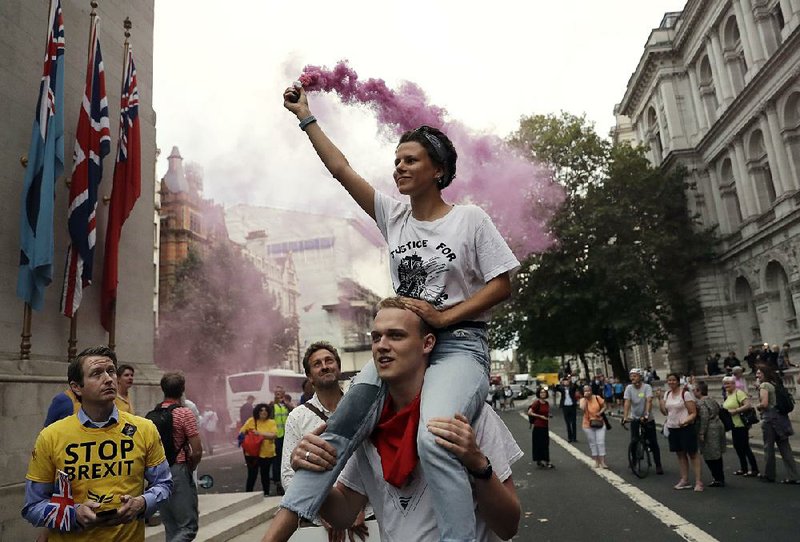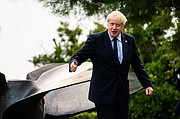LONDON -- British Prime Minister Boris Johnson maneuvered Wednesday to give his political opponents even less time to block a no-deal Brexit before the Oct. 31 withdrawal deadline, winning Queen Elizabeth II's approval to suspend Parliament.
Though Johnson previously had refused to rule out such a move, the timing of the decision took lawmakers -- many of whom are on vacation -- by surprise.
Johnson insisted that he was taking the step so he could outline his domestic agenda, and he shot down the notion that he was curbing debate, saying there would be "ample time" to discuss Brexit and other issues.
Lawmakers reacted with fury, including John Bercow, speaker of the lower House of Commons, who was not told in advance of Johnson's plan.
"Shutting down Parliament would be an offense against the democratic process and the rights of parliamentarians as the people's elected representatives," Bercow said. "Surely at this early stage in his premiership, the prime minister should be seeking to establish rather than undermine his democratic credentials and indeed his commitment to Parliamentary democracy."
The main opposition Labor Party leader Jeremy Corbyn wrote to the queen to protest "in the strongest possible terms on behalf of my party and I believe all the other opposition parties are going to join in with this."
The monarch, however, kept with her steadfast refusal to get involved in politics.
The House of Commons will convene from Tuesday to Sept. 10 and then was scheduled to go on a break until Oct. 9 -- though lawmakers had suggested that they might cancel that break and stay in session because of the Brexit crisis.
Johnson said he decided to ask the queen to give her speech that outlines the government's legislative agenda on Oct. 14, and she approved suspending Parliament for a total of 32 days between Sept. 12 and Oct. 14. That makes it unlikely that the lawmakers would have enough time to pass laws blocking the U.K.'s withdrawal from the European Union without a negotiated divorce deal by Oct. 31.
Suspending, or proroguing, Parliament is not unheard of -- it happens most years in connection with the queen's speech, often in May or June. But the five-week gap this time is the longest such break since 1945. Recent suspensions have been measured in days, not weeks.
"This is completely normal procedure," House of Commons leader Jacob Rees-Mogg told Sky News.
But shadow chancellor John McDonnell tweeted: "Make no mistake, this is a very British coup."
"Whatever one's views on Brexit, once you allow a Prime Minister to prevent the full and free operation of our democratic institutions you are on a very precarious path," he said.
Guy Verhofstadt, the European Parliament's chief Brexit official, called Johnson's move "sinister."
"As a fellow parliamentarian, my solidarity with those fighting for their voices to be heard," he tweeted. "Suppressing debate on profound choices is unlikely to help deliver a stable future EU-UK relationship."
The EU is adamant that it will not renegotiate the agreement struck with former Prime Minister Theresa May on the terms of Britain's departure and the framework of future relations. Without such a deal, Britain faces a chaotic Brexit that economists warn would disrupt trade by imposing tariffs and customs checks between Britain and the bloc, send the value of the pound plummeting and plunge the U.K. into recession. May resigned after failing -- three times -- to secure Parliament's backing for her divorce deal with the bloc.
On Wednesday, the Sun newspaper reported that Ruth Davidson, the Scottish Conservative Party leader credited with turning around Conservative fortunes in Scotland, will resign her post over Johnson's Brexit policies and the pressures of being a new mother.
A spokesman for Davidson said she would make her position clear "in due course," and there would be no further comment Wednesday on the Sun report, which cited people in the Scottish Conservative Party it didn't identify.
Losing Davidson would be a blow to the Scottish Conservatives, and English ones too. May's government survived the 2017 election only because of Davidson's campaigning in Scotland that delivered 13 seats for the party.
She was a leading advocate for staying in the EU in the 2016 referendum and repeatedly clashed with Johnson in a TV debate days before the vote, accusing him of misleading voters.
PROTESTERS RILED
Thousands of people Wednesday evening took to the street across Britain to protest Johnson's decision to suspend Parliament.
Impromptu demonstrations were held in London, Edinburgh, Cardiff, Manchester, Bristol, Cambridge and Durham, the Press Association reported, as a petition against the suspension passed the 1 million signatures mark late Wednesday.
"Parliament must not be prorogued or dissolved unless and until the Article 50 period has been sufficiently extended or the U.K.'s intention to withdraw from the EU has been canceled," read the petition, which needed 100,000 signatures to be debated in parliament.
Lawmakers already are asking a Scottish court to rule that suspending Parliament is illegal. If that fails, pro-EU legislators are also planning to try to pass a law banning a no-deal Brexit, although the government has now sharply limited their time to do that.
Another option is to take down the government with a no-confidence vote. That would spark a 14-day period in which Johnson could try to overturn the result. If he failed, there would be a general election -- but the government believes it would not have to be held until after the Oct. 31 Brexit deadline.
During that key 14 days after a no-confidence vote, another lawmaker could try to win Parliament's backing in a vote. If the effort succeeded, Johnson should, in theory, have to step down and let the winner form a government.
But the rules were introduced in a 2011 law and have never been tested, leaving plenty of room for argument.
"If Parliament is suspended to suit Boris Johnson, it's not just going to be suspended from discussing Brexit. We could go to war," Labor spokeswoman on legal issues Shami Chakrabarti told the BBC. "People will work together to stop this unconstitutional suspension of Parliament, and we will get greater unity on that even than on stopping a no-deal Brexit."
On Tuesday, opposition lawmakers declared that they would join forces to try to stop a departure from the EU without an agreement, setting up a legislative challenge to Johnson and his past promises to complete the divorce deal.
Some 160 lawmakers have signed a declaration pledging "to do whatever is necessary" to prevent Johnson from bypassing Parliament.
Johnson has told European officials that it won't be possible to agree on a deal on Britain's departure from the bloc without the removal of controversial language on a "backstop" aimed at avoiding the return of a border between EU member Ireland and Britain's Northern Ireland. He said at the close of the G-7 summit in Biarritz, France, on Monday that he was "marginally more optimistic" of progress.
Scott Lucas, a professor of international politics at the University of Birmingham, said Johnson's maneuver touched off the biggest crisis since the abdication of King Edward VIII to marry the divorced American socialite, Wallis Simpson.
"This is the biggest constitutional crisis since the 1930s," Lucas said. "Even World War II didn't present a constitutional crisis because the coalition government and Parliament agreed on the rules of the game."
Johnson did earn support from one big backer: U.S. President Donald Trump. Just days after the two met at the G-7 summit, Trump reaffirmed his support by tweeting that the prime minister "is exactly what the U.K. has been looking for, & will prove to be 'a great one!'"
Meanwhile, the pound plunged on news of Johnson's plan to suspend Parliament, down to $1.2196 from almost $1.2300 the previous day, adding to the uncertainty that is already discouraging companies from investing.
"Businesses feel like Westminster is playing an endless game of political chess, while their futures and the health of the U.K. economy hang in the balance," said Adam Marshall, director general of the British Chambers of Commerce. "None of the events of the last few days have given businesses greater confidence."
A sudden imposition of trade barriers could induce a major supply and demand-side shock, economists say. A break in the harmonization of regulations between the U.K. and its largest trading partner alongside limits on the movement of people would also be devastating for services, the largest part of the British economy.
Bank of England Gov. Mark Carney has said businesses are doing what they can to prepare, but they still expect output to fall. Speaking at a Federal Reserve symposium in Jackson Hole, Wyo., last week, Carney said "the biggest economic headwind is weak business investment, which has stagnated over the past few years," and "there is overwhelming evidence that this is a direct result of uncertainties over the U.K.'s future trading relationship with the EU."
Information for this article was contributed by Danica Kirka and Jill Lawless of The Associated Press; by Jill Ward, Eddie Spence, Jessica Shankleman and Robert Hutton of Bloomberg News; by Karla Adam, Michael Birnbaum, Jennifer Hassan and Quentin Aries of The Washington Post; and by Christiane Oelrich of dpa.
A Section on 08/29/2019

